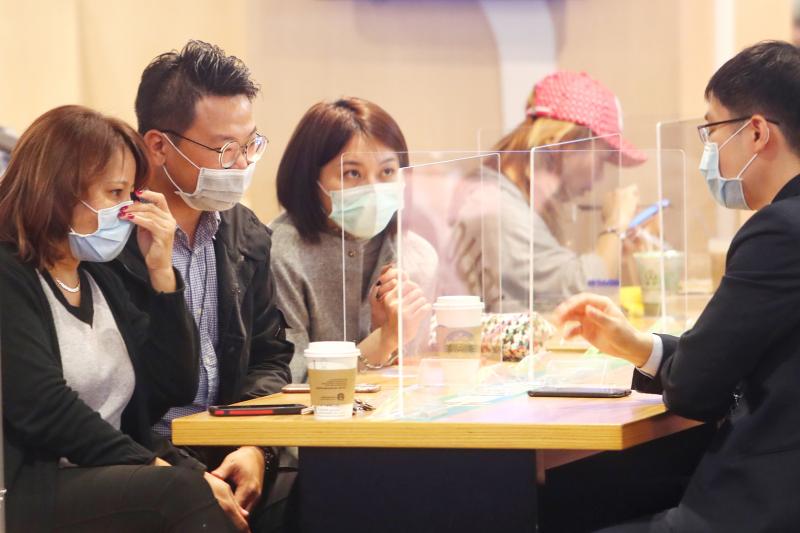Minister of Health and Welfare Chen Shih-chung (陳時中) yesterday elaborated on the rules for “social distancing” and said that the government is providing subsidies to encourage more hotels to become quarantine hotels.
Chen on Tuesday urged the public to practice social distancing by keeping at least 1m apart outdoors and 1.5m apart indoors.
If maintaining such distances is not possible due to confined or crowded spaces, then everyone should wear a mask, Chen yesterday told a daily news briefing at the Central Epidemic Command Center (CECC) in Taipei.

Photo: CNA
The center also suggested that people avoid exhibitions, sports events, concerts and other social activities that require close interaction with others, as well as nonessential visits to entertainment venues, whose owners — if they are likely to have close interactions with others and cannot wear masks — should consider suspending operations.
The flexible policy that has been implemented is mainly aimed at persuading people to observe proper social distancing, said Chen, who heads the center.
Stricter regulations and corresponding penalties might be introduced if the virus crisis worsens, but the center has not set a time frame or conditions for their implementation, he added.
People should wear a mask when traveling on MRT metropolitan rail networks and high-speed trains, where it is difficult to maintain a safe distance, Chen said.
Students in the same class are not random strangers, so they do not necessarily have to wear a mask if the classroom has proper ventilation, he said.
Restaurant owners can consider installing divider boards to separate customers to reduce the risk of infection, he added.
In addition, the Tourism Bureau is providing a subsidy of NT$1,000 per room per night until June 30 to encourage more hotels to become quarantine hotels for people in home quarantine, Chen said.
Hotels would be required to comply with establishment and management regulations for quarantine hotels published by the center and cooperate with the bureau and local government policies, the CECC said.
While people who break home quarantine orders were previously fined and taken to a centralized quarantine center if they breached the order twice, Chen said that they would now be remanded to a quarantine facility after the first offense, deprived of a government quarantine subsidy and required to pay for additional expenses, including their accommodations.
Deputy Minister of the Interior Chen Tsung-yen (陳宗彥), who is deputy head of the CECC, said that the number of people in mandatory home quarantine hit a high of more than 55,000 on Saturday last week, but had fallen to about 48,000 as of yesterday.
Effective immediately, residents of outlying islands who are placed in home quarantine would be banned from taking domestic flights or boat rides, so they would have to complete the 14-day quarantine on Taiwan proper, he said.
In addition, a temporary ban on international transit flights is to be extended until April 30, he added.
Separately yesterday, the Environmental Protection Administration increased the minimum fine for dumping masks from NT$1,200 to NT$3,600.
People caught dumping masks face a fine of NT$3,600 for a first offense and NT$6,000 for each repeat infraction, it said.
Additional reporting by Lin Chia-nan

Several Chinese Nationalist Party (KMT) officials including Chairman Eric Chu (朱立倫) are to be summoned for questioning and then transferred to prosecutors for holding an illegal assembly in Taipei last night, the Taipei Police said today. Chu and two others hosted an illegal assembly and are to be requested to explain their actions, the Taipei City Police Department's Zhongzheng (中正) First Precinct said, referring to a protest held after Huang Lu Chin-ju (黃呂錦茹), KMT Taipei's chapter director, and several other KMT staffers were questioned for alleged signature forgery in recall petitions against Democratic Progressive Party (DPP) legislators. Taipei prosecutors had filed

Taiwan would welcome the return of Honduras as a diplomatic ally if its next president decides to make such a move, Minister of Foreign Affairs Lin Chia-lung (林佳龍) said yesterday. “Of course, we would welcome Honduras if they want to restore diplomatic ties with Taiwan after their elections,” Lin said at a meeting of the legislature’s Foreign Affairs and National Defense Committee, when asked to comment on statements made by two of the three Honduran presidential candidates during the presidential campaign in the Central American country. Taiwan is paying close attention to the region as a whole in the wake of a

President William Lai (賴清德) has appointed former vice president Chen Chien-jen (陳建仁) to attend the late Pope Francis’ funeral at the Vatican City on Saturday on his behalf, the Ministry of Foreign Affairs said today. The Holy See announced Francis’ funeral would take place on Saturday at 10am in St Peter’s Square. The ministry expressed condolences over Francis’ passing and said that Chen would represent Taiwan at the funeral and offer condolences in person. Taiwan and the Vatican have a long-standing and close diplomatic relationship, the ministry said. Both sides agreed to have Chen represent Taiwan at the funeral, given his Catholic identity and

Lawmakers from the Democratic Progressive Party (DPP) yesterday established a friendship group with their counterparts in Ukraine to promote parliamentary exchanges between the two countries. A ceremony in Taipei for the Taiwan-Ukraine Parliamentary Friendship Association, initiated by DPP Legislator Chen Kuan-ting (陳冠廷), was attended by lawmakers and officials, including Deputy Minister of Foreign Affairs Francois Wu (吳志中) and European Economic and Trade Office in Taiwan Director Lutz Gullner. The increasingly dire situation in Ukraine is a global concern, and Taiwan cannot turn its back when the latter is in need of help, as the two countries share many common values and interests,